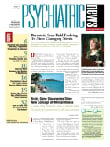They both have challenges with listening, organization, and follow through. She is often confused and overwhelmed, and her inability to manage paperwork affects her success at work. She worries about how disorganized her home environment is. But he is often angry and frustrated, sometimes responding to normal workday interactions with rage. His coworkers complain about his "attitude," and his short fuse makes for a tense atmosphere at work and at home.
Both of these patients suffer from adult attention-deficit/hyperactivity disorder (ADHD), but a team of researchers based in Boston and New York said that he has an additional component of ADHD known as deficient emotional self-regulation (DESR), possibly a distinct familial subtype or variant of ADHD.
In a study published by the researchers in the April American Journal of Psychiatry, they defined DESR as characterized by
deficits in self-regulating the physiological arousal caused by emotions,
difficulty inhibiting inappropriate behavior in response to the person's own positive or negative emotions,
problems refocusing attention from strong emotions, and
disorganization of coordinated behavior in response to emotional activation.
"DESR traits include low frustration tolerance, impatience, and quickness to anger as well as being easily excited in response to emotional reactions," said the researchers. "These traits have been identified as common in presentations of ADHD in adulthood, but are not considered to be diagnostic of ADHD."
"An emotional component to ADHD has been recognized for some time but has not been well characterized," said Stephen Faraone, Ph.D., one of the investigators. He is a professor of psychiatry and of neuroscience and physiology and director of medical genetics research and child and adolescent psychiatry research at SUNY Upstate Medical University in Syracuse, N.Y. "We sought to provide a more comprehensive understanding of DESR and its implications for ADHD patients."
The researchers assessed 83 probands with and without ADHD and 128 of their siblings. They defined DESR in adult probands and siblings using items from the Barkley Current Behavior Scale.
They found that siblings of ADHD probands were at elevated risk of having ADHD, irrespective of the presence or absence of DESR in the proband. The risk for DESR was elevated in siblings of probands who had ADHD plus DESR probands but not in siblings of probands with ADHD but not DESR.
They concluded that the pattern of inheritance of ADHD with DESR preliminarily suggests that DESR may be a familial subtype of ADHD, and the team is optimistic that the discovery will lead to better treatment of patients with the subtype.
"We hope to determine which psychopharmacologic or psychological treatments will be beneficial for treating DESR in ADHD patients. We also hope to determine if subtyping ADHD patients based on DESR improves our understanding of the causes of the disorder," Faraone told Psychiatric News.
The work was supported in part by a National Institutes of Health grant to Faraone and a grant from Shire Pharmaceuticals.
